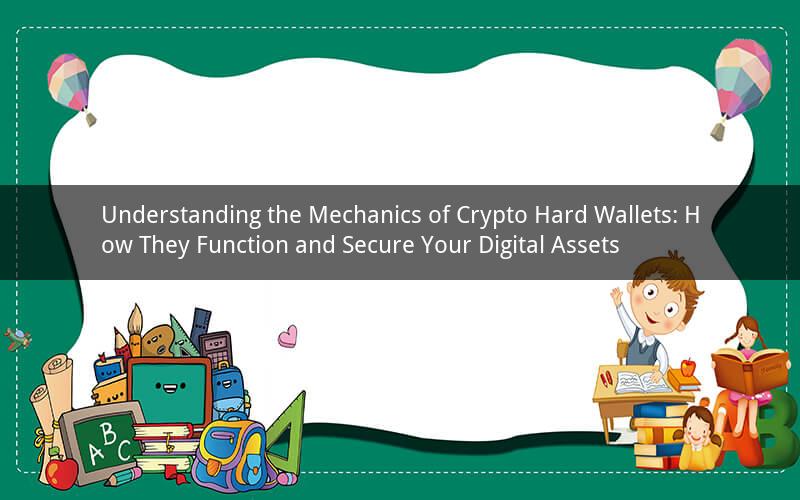
In the ever-evolving world of cryptocurrencies, the need for secure storage solutions has become paramount. Among the various storage options available, hard wallets have emerged as a robust and reliable choice. But how do crypto hard wallets work? This article delves into the inner workings of these devices, explaining their mechanisms and highlighting their significance in safeguarding your digital assets.
The Concept of Crypto Hard Wallets
Crypto hard wallets, also known as cold wallets, are physical devices designed to store cryptocurrencies offline. Unlike software wallets, which store your private keys on a computer or smartphone, hard wallets store your keys in a secure, physical form. This offline nature makes them less susceptible to hacking and malware attacks, ensuring the safety of your digital assets.
The Core Components of a Crypto Hard Wallet
To understand how crypto hard wallets work, it's essential to know their core components:
1. Private and Public Keys: Every cryptocurrency transaction requires a pair of keys—a private key and a public key. The private key is a secret code that allows you to access your funds, while the public key is used to receive payments. Hard wallets store these keys securely.
2. Display Screen: Hard wallets come with a display screen that shows information about your transactions and keys. This feature allows users to verify transactions before confirming them.
3. Physical Security: These wallets are designed with physical security in mind. They often have features like tamper-evident seals, metal cases, and biometric authentication to protect against unauthorized access.
4. Software: Hard wallets require software to interact with them. This software allows users to manage their wallets, monitor their balances, and perform transactions.
How Crypto Hard Wallets Work
Now that we've discussed the components of a hard wallet, let's explore how they work:
1. Generating Keys: When you set up a hard wallet, it generates a pair of private and public keys. These keys are derived from a seed phrase, a series of random words that acts as a backup. The seed phrase is crucial, as it allows you to recover your funds if the wallet is lost or damaged.
2. Storing Keys: The private key is stored securely within the hard wallet's hardware. This ensures that your keys are not exposed to potential online threats. The public key is displayed on the wallet's screen for receiving payments.
3. Verifying Transactions: When you want to send funds, the hard wallet's software generates a transaction with your private key. The transaction is then displayed on the wallet's screen for your review. You can verify the recipient's address, amount, and transaction fees before confirming the transaction.
4. Signing Transactions: Once you confirm the transaction, the hard wallet signs it using your private key. This signature proves that you are the owner of the funds and allows the transaction to be broadcasted to the blockchain.
5. Blockchain Confirmation: The signed transaction is then broadcasted to the blockchain, where miners validate it and add it to a new block. Once the block is confirmed, your transaction is complete, and the funds are transferred to the recipient's wallet.
The Importance of Crypto Hard Wallets
Crypto hard wallets play a vital role in securing your digital assets. Here are some reasons why they are essential:
1. Protection Against Hacking: By storing your private keys offline, hard wallets shield your funds from online threats like malware and phishing attacks.
2. Safeguarding Against Lost Keys: Hard wallets offer a backup solution in the form of a seed phrase. This allows you to recover your funds if the wallet is lost or damaged.
3. Enhanced Security: The physical security features of hard wallets, such as tamper-evident seals and biometric authentication, provide an additional layer of protection against unauthorized access.
4. User-Friendly: Despite their advanced security features, hard wallets are designed to be user-friendly. The display screen and software make it easy to manage your funds and perform transactions.
Frequently Asked Questions (FAQs)
1. Question: Can I use a crypto hard wallet for any cryptocurrency?
Answer: Yes, most hard wallets support multiple cryptocurrencies. However, it's essential to check the compatibility of the wallet with the specific cryptocurrencies you wish to store.
2. Question: How long does it take for a transaction to be confirmed on the blockchain?
Answer: The time it takes for a transaction to be confirmed can vary depending on the blockchain network and the transaction fees. Generally, it takes a few minutes to a few hours.
3. Question: Can I transfer funds from a hard wallet to a software wallet?
Answer: Yes, you can transfer funds from a hard wallet to a software wallet. However, it's essential to use the correct private key and ensure that the software wallet supports the specific cryptocurrency you are transferring.
4. Question: What should I do if I lose my seed phrase?
Answer: Losing your seed phrase means losing access to your funds. It's crucial to keep your seed phrase safe and secure. If you lose it, you may need to consult the wallet manufacturer or a professional for assistance in recovering your funds.
5. Question: Are crypto hard wallets susceptible to physical damage?
Answer: Yes, like any physical device, hard wallets can be susceptible to physical damage. It's essential to handle them with care and store them in a safe, secure location to prevent damage.